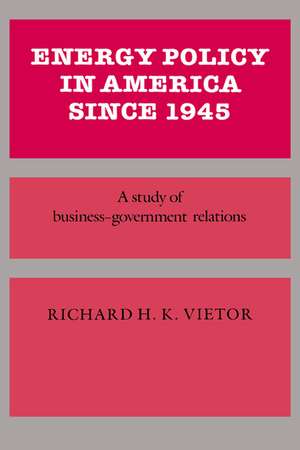Energy Policy in America since 1945: A Study of Business-Government Relations: Studies in Economic History and Policy: USA in the Twentieth Century
Autor Richard H. K. Vietoren Limba Engleză Paperback – 29 ian 1987
| Toate formatele și edițiile | Preț | Express |
|---|---|---|
| Paperback (1) | 321.14 lei 43-57 zile | |
| Cambridge University Press – 29 ian 1987 | 321.14 lei 43-57 zile | |
| Hardback (1) | 964.30 lei 43-57 zile | |
| Cambridge University Press – 14 oct 1984 | 964.30 lei 43-57 zile |
Preț: 321.14 lei
Nou
Puncte Express: 482
Preț estimativ în valută:
61.47€ • 66.79$ • 51.67£
61.47€ • 66.79$ • 51.67£
Carte tipărită la comandă
Livrare economică 21 aprilie-05 mai
Preluare comenzi: 021 569.72.76
Specificații
ISBN-13: 9780521335720
ISBN-10: 0521335728
Pagini: 384
Dimensiuni: 152 x 230 x 22 mm
Greutate: 0.5 kg
Ediția:Revised
Editura: Cambridge University Press
Colecția Cambridge University Press
Seria Studies in Economic History and Policy: USA in the Twentieth Century
Locul publicării:New York, United States
ISBN-10: 0521335728
Pagini: 384
Dimensiuni: 152 x 230 x 22 mm
Greutate: 0.5 kg
Ediția:Revised
Editura: Cambridge University Press
Colecția Cambridge University Press
Seria Studies in Economic History and Policy: USA in the Twentieth Century
Locul publicării:New York, United States
Cuprins
List of charts and figures; List of tables; Editors' preface; Acknowledgments; List of abbreviations; 1. Introduction: the political economy of energy; Part I. The Transition to Peace and Fluid Fuels, 1945–58: 2. The foundations of postwar policy; 3. 'Stepping right out' with synthetic fuels; 4. Regulating natural gas in the absence of economics; 5. Oil imports: the failure of voluntarism; Part II. Managing Surplus Through the Politics of Stasis, 1959–68: 6. Oil import quotas; 7. Formula for shortage: natural gas price controls; 8. Sunfuels revisited: nostrum for the coal industry; Part III. The Second Energy Transition: Adjustment to Depletion, 1969–80: 9. Energy crisis and structural change; 10. Equity versus efficiency: oil price controls; 11. Natural gas: the dilemma of regulatory transition; 12. Natural gas: the consequences of scarcity; 13. National energy management; 14. Business, government, and public policy; Index.
Recenzii
'Professor Vietor gives us a lucid and detailed description of America's energy policy since the end of World War II. He not only presents us with an authoritative history, but he also presents a new view of the interactions between business and government under changing conditions. This book should be read by anyone who is interested in energy policy, business history, or business–government relations - which means everyone.' Robert B. Stobaugh, Harvard Business School
'Anyone seriously interested in understanding the uncertain development of America's energy policy since the end of World War II will find Mr. Vietor's book essential reading. It graphically demonstrates the difficulty of developing a sound and sensible energy policy for a nation which is both a major consumer and major developer of energy, with a divided public and strong interest groups on every side. I heartily recommend it as well to those interested in the infinitely fascinating relationship between business and government in the development of national policy, for it illuminates this area so well.' Stuart E. Eizenstat
'Anyone seriously interested in understanding the uncertain development of America's energy policy since the end of World War II will find Mr. Vietor's book essential reading. It graphically demonstrates the difficulty of developing a sound and sensible energy policy for a nation which is both a major consumer and major developer of energy, with a divided public and strong interest groups on every side. I heartily recommend it as well to those interested in the infinitely fascinating relationship between business and government in the development of national policy, for it illuminates this area so well.' Stuart E. Eizenstat
Descriere
This 1985 book puts business–government relations in modern America in a critical new perspective.
































